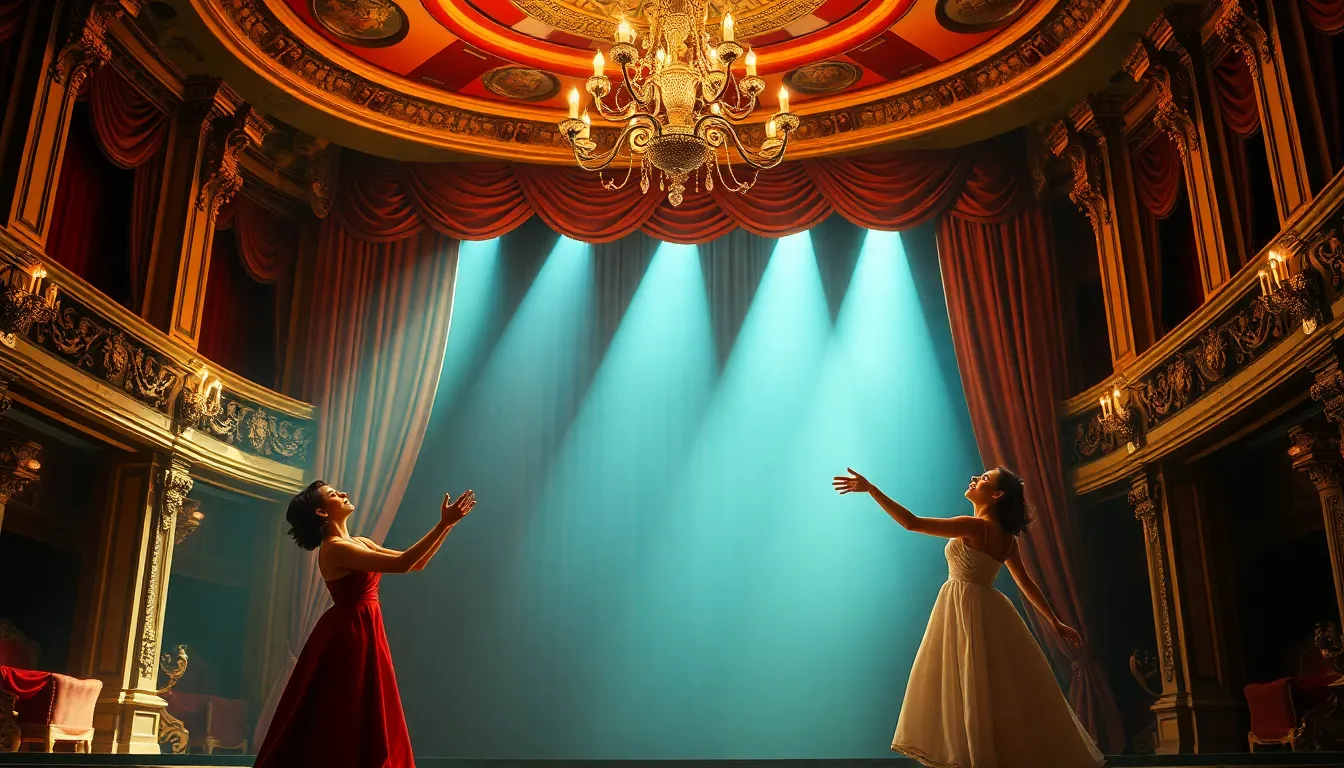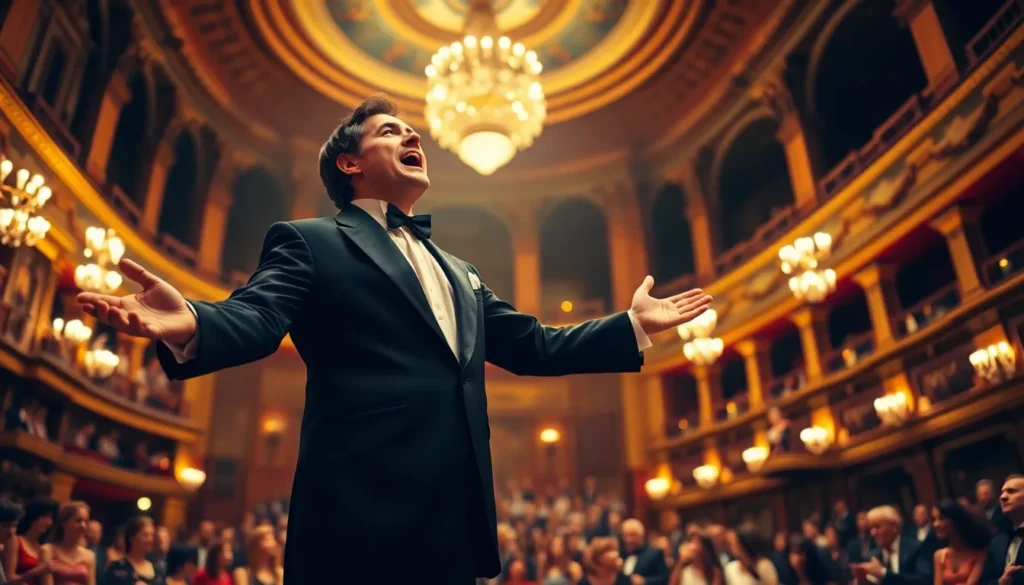Table of Contents
ToggleWhen it comes to the world of music, few things can match the drama and passion of Italian opera. Picture this: a grand stage, a breathtaking aria, and a singer whose voice could shatter glass and melt hearts all at once. Italian opera singers have a knack for turning every performance into an unforgettable spectacle, blending emotion with technical skill like a fine balsamic vinegar drizzled over a gourmet dish.
From the legendary Luciano Pavarotti to the captivating Anna Netrebko, these vocal virtuosos have enchanted audiences for centuries. Their powerful voices and theatrical flair bring stories to life, making even the most mundane plot twists feel like a matter of life and death. So, whether you’re a seasoned opera buff or just curious about what all the fuss is about, dive into the world of Italian opera singers and discover why they’re the ultimate divas of the musical realm.
Overview Of Italian Opera Singers
Italian opera singers hold a unique position in the world of music, revered for their exceptional vocal abilities and dramatic flair. These artists excel in various styles, including bel canto, verismo, and opera seria, each showcasing different aspects of their artistry. Their extensive training often involves rigorous vocal techniques combined with theatrical skills, necessary for captivating audiences.
Luciano Pavarotti remains one of the most iconic figures in Italian opera, recognized for his powerful tenor voice. He contributed significantly to popularizing opera worldwide, bridging the gap between classical and contemporary audiences. Anna Netrebko also exemplifies modern Italian opera, bringing both beauty and charisma to her performances. Her interpretations of classic roles resonate with both seasoned fans and newcomers.
Operatic performances typically unfold in grand venues, amplifying the singers’ talents and emotional expressions. Italy’s rich operatic history nurtures numerous talented artists, who often undergo years of education and practice to hone their craft. Notable operatic competitions, such as the International Pavarotti Competition, highlight emerging singers, fostering new talent.
Italian opera’s emotional depth allows singers to convey complex narratives, often exploring themes of love, betrayal, and redemption. The dynamic interplay between vocal technique and stage presence creates a multi-sensory experience, engaging audiences deeply. Their ability to evoke feelings through music cements Italian opera singers’ status as the ultimate divas of the genre.
Italian opera singers embody a blend of technical skill and emotive storytelling, captivating audiences globally with their artistry.
Notable Italian Opera Singers

Italian opera singers have left a lasting impact on the world of classical music, showcasing incredible talent and artistry across generations. Renowned for their unique vocal styles and emotive performances, these artists continue to captivate audiences.
Historical Legends
Among the historical legends, Enrico Caruso stands out as a defining figure. His powerful tenor voice established him as one of the first international opera stars in the early 20th century. Giacomo Puccini, known for operatic masterpieces like “La Bohème” and “Tosca”, transformed the Italian opera scene with his emotive storytelling. Another key figure, Giuseppe Verdi, composed “La Traviata” and “Aida”, influencing operatic performances with his profound characters and intricate melodies. These historical icons remain foundational to Italian opera, shaping the genre’s rich legacy.
Contemporary Icons
Contemporary icons include Andrea Bocelli, whose blend of classical and pop genres attracts a diverse listening audience. Cecilia Bartoli, widely celebrated for her stunning mezzo-soprano voice, brings authenticity to her performances, particularly in Baroque opera. Another standout, Jonas Kaufmann, showcases his dramatic artistry and versatility across numerous operatic roles. Opera today also features Anna Netrebko, renowned for her stunning vocal ability and stage presence. These modern singers highlight the continued evolution of Italian opera, inspiring both new audiences and seasoned fans alike.
Vocal Techniques And Styles
Italian opera singers employ various vocal techniques and styles that showcase their artistry. They master the art of expression through rigorous training and discipline.
Bel Canto Tradition
Bel canto emphasizes beauty of tone and technical skill. Singers perfect legato singing, achieving smooth transitions between notes. This style allows vocalists to demonstrate agility and control, vital for executing elaborate ornamentation. Training involves breath control and dynamic range, enhancing emotive delivery. Renowned bel canto composers include Bellini and Donizetti, contributing to dramatic storytelling through music. Performers like Luciano Pavarotti exemplify this tradition, captivating audiences with their clarity and precision.
Modern Interpretations
Modern interpretations of Italian opera blend traditional techniques with contemporary influences. Singers explore diverse genres, incorporating pop and musical theater elements. This fusion creates a fresh approach to the seasoned repertoire. Artists like Anna Netrebko and Andrea Bocelli highlight emotional authenticity and versatility in their performances. Vocal techniques adapt, as they connect with audiences on multiple levels. Productions increasingly utilize innovative staging and technology, transforming the concert experience. This evolution keeps the operatic art form relevant and engaging for new generations.
Impact On The Opera Scene
Italian opera singers significantly shape both the national and international opera landscape, influencing how audiences experience this art form.
Influence On Global Opera
Italian artists have set performance standards that resonate worldwide. Renowned figures like Luciano Pavarotti popularized opera, introducing it to masses beyond traditional audiences. Cultural exchanges facilitated by these singers often help bridge gaps between diverse musical styles. Modern performers continue this legacy, incorporating elements from various genres, enhancing global appreciation for opera. The rise of streaming platforms also enables international audiences to access performances, showcasing the universal appeal of Italian operatic talent.
Contributions To Italian Culture
Italian opera singers play a pivotal role in Italy’s cultural identity. Their artistry reflects the country’s rich history and emotional depth. These performers help preserve and promote the Italian language through lyrical expression, ensuring its beauty remains integral to operatic works. Festivals celebrating opera, such as those in Verona and Naples, highlight the country’s artistic heritage. National pride is often inspired by the achievements of these singers, who bring global recognition to Italy’s artistic legacy. Their influence extends beyond the stage, impacting various creative fields, from fashion to film.
Challenges Faced By Italian Opera Singers
Italian opera singers encounter various challenges throughout their careers. Training demands significant time and dedication, often requiring years of rigorous vocal and theatrical education. Singers typically must master multiple styles, each with its distinct techniques and expressive requirements.
Competition in the field remains intense. Emerging talents often vie for roles in prestigious opera houses, making it essential for singers to continuously refine their skills. Networking and building relationships within the industry are crucial for securing performance opportunities.
Physical health poses additional difficulties. Vocal strain and potential injuries from demanding performances can derail a singer’s progress. Maintaining overall fitness and vocal health is imperative to sustain endurance during rehearsals and shows.
Cultural expectations also influence the landscape. Singers’ interpretations of roles may face scrutiny based on traditional representations of characters. Balancing heritage with personal artistic expression creates tension for some performers.
Language barriers represent another hurdle. Mastery of Italian and other languages enhances a singer’s performance. Learning pronunciation and understanding linguistic nuances becomes essential for conveying emotional depth effectively.
Economic factors subtly shape careers as well. Funding cuts for arts programs can limit opportunities for aspiring opera singers. With financial backing crucial for emerging artists, securing support through sponsorships or grants becomes vital.
Technological advancements impact the way performers engage with audiences. Streaming and social media platforms necessitate that singers adapt their promotional strategies while balancing artistic integrity. Navigating the digital landscape demands a savvy approach to connecting with fans and enhancing visibility.
Overall, Italian opera singers strive to thrive in a competitive, evolving environment while mastering their craft and addressing these multifaceted challenges.
Italian opera singers embody the essence of artistry and emotion within the operatic tradition. Their remarkable vocal talents and dramatic interpretations continue to resonate with audiences around the world. As they navigate the complexities of their craft, these performers not only honor a rich cultural legacy but also adapt to modern influences, ensuring the genre remains vibrant and relevant.
The dedication and passion of these artists inspire new generations to appreciate the beauty of opera. With each performance, they invite listeners into a world of profound storytelling and emotional depth. The future of Italian opera looks bright as these exceptional talents continue to captivate and innovate, solidifying their place in the hearts of opera lovers everywhere.





